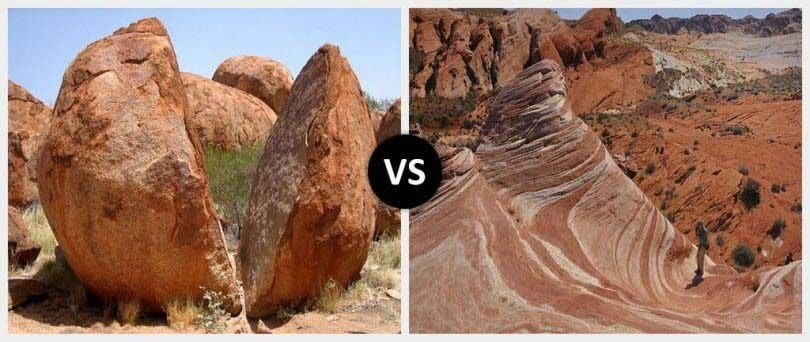Which Best Describes How Mechanical and Chemical Weathering Work Together
A cave or a chamber in a cave. Chemical weathering is the breakdown of rock by chemical processes.

Physical Weathering Vs Chemical Weathering Diffzi
Tree roots that grow in rock cracks.

. Mechanical and chemical weathering work together to speed up the weathering process by causing rocks to crumble and changing the temperature of the rocks. Which best describes how mechanical and chemical weathering work together. 14 Is mechanical weathering faster than chemical weathering.
Water can get into a substance and. Mechanical weathering only involves the physical breakage of rocks to smaller pieces of fragments. As rock dissolves it solidifies into columns.
The breaking down of rocks and minerals as a result of chemical reactions with the surrounding air and water is called chemical weatheringOxidationcarbonationhydrolysis and decomposition are the processes involved. Mechanical weathering is the physical breakdown of rock into smaller pieces. Also general abrasion or expansion and contraction of the rock with the weather can break it down.
See answer 1 Best Answer. Cold temperatures favor mechanical weathering while warm. Occurs when chemical reactions cause permanent changes to rocks and other physical features.
Mechanical weathering is caused by wind sand rain freezing thawing and other natural forces that can physically alter rock. Biological weathering is caused by the actions of plants and animals as they grow nest and burrow. Water that has a high pH attacks the rock internally.
Chemical weathering changes the composition of rocks often transforming them when water interacts with minerals to create various chemical reactions. Kaneppeleqw and 4 more users found this answer helpful. Without changing the physical composition of the rocks mechanical weathering disintegrates rocks with natures own physical pressures.
Which best describes how mechanical and chemical weathering work together. 11 Do mechanical weathering and chemical weathering operate independently of each other explain. Chemical weathering occurs when rocks.
Answer 1 of 4. Ice freezing and making larger cracks in a rock. A large underground chamber typically of natural origin in a hillside or cliff.
Physical weathering is also called mechanical weathering or disaggregation. 13 How do mechanical weathering and chemical weathering occur. Mechanical weathering breaks rocks down into smaller pieces.
Mechanical weathering is the physical breakdown of rock into smaller pieces. How do water and ice cause mechanical weathering. Freezing and thawing act as an ice wedge which make cracks.
12 Which best describes how mechanical and chemical weathering work together. Mixing water and carbon dioxide. An example of how mechanical and chemical weathering processeswork together is water chemical and temperature mechanical.
Mechanical biological and chemical. Mechanical and chemical weathering work together to speed up theweathering process by causing rocks to crumble and changing thetemperature of the rocks. While physical weathering is accentuated in very cold or very dry environments chemical reactions are most intense where the climate is wet and hot.
Acid rain unnaturally or water absorbs minerals like if you put a salt cube in a glass of water the cube would break down and dissolve. Is the physical breakdown of rock material. Water can cause mechanical weathering when rivers or ocean waves cause rocks to collide and scrape against each other.
Physical and chemical weathering work together in complementary ways. This causes the rock to expand and withtime. Climate is very important in the weathering process.
Mechanical or physical weathering involves the breakdown of rocks and soils through direct contact with atmospheric conditions such as heat water ice and pressure. There are three types of weathering.

What Is The Difference Between Physical Weathering And Chemical Weathering Lisbdnet Com

What Is The Difference Between Mechanical And Chemical Weathering Lisbdnet Com
No comments for "Which Best Describes How Mechanical and Chemical Weathering Work Together"
Post a Comment